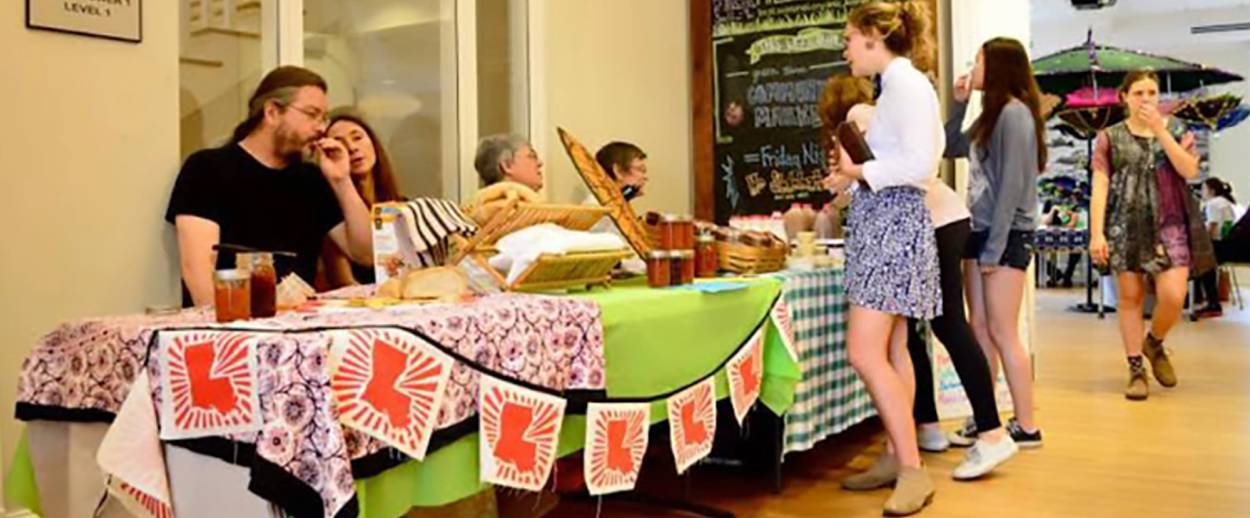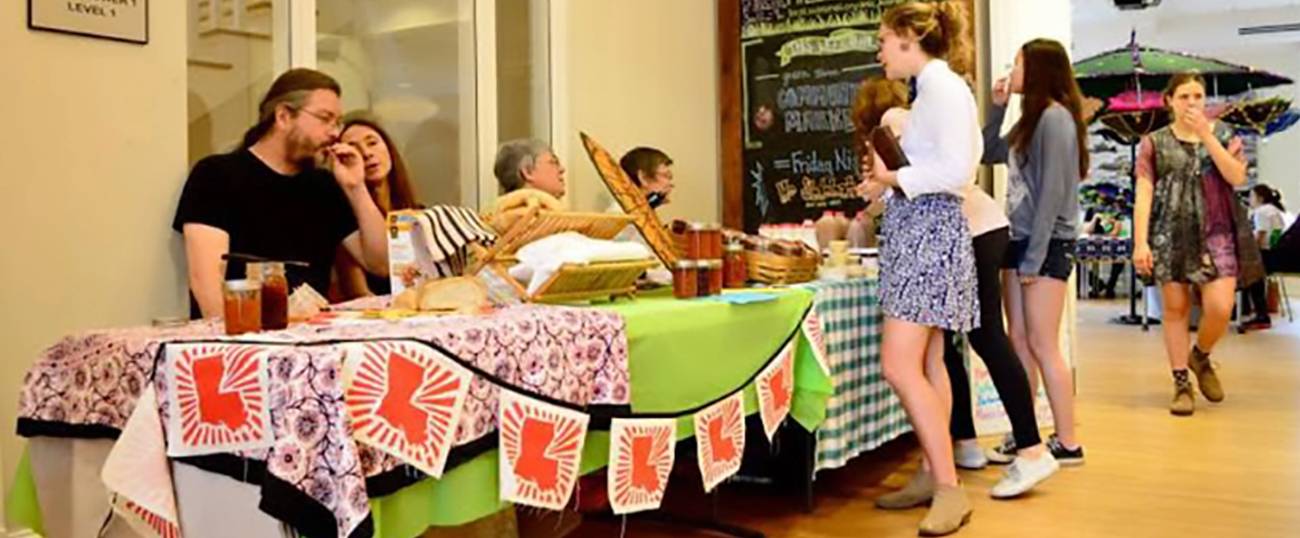Non-Jewish College Students Find an Unexpected Home on Campus—at Hillel
Whether they’re drawn by social programs, religious practice, or the food, non-Jews have changed the face of the organization




Nellie Gayle’s introduction to Jewish life on campus began, appropriately, with bagels. In 2011, during her first week at Barnard College, a Jewish friend mentioned a bagel brunch at Hillel. The event sounded like fun, but Gayle, who grew up in an irreligious household in Eugene, Ore., figured that it would be impossible for her to attend, because she wasn’t Jewish. After some encouragement from her friend, she decided to go. Three years later, she returns to school this week as one of the most active members of Columbia/Barnard Hillel.
“Hillel encouraged me to explore my own spirituality,” said Gayle. She has even begun to incorporate certain Jewish values into her worldview. “Just coming into contact with Judaism has made me really committed to not speaking lashon hara,” or gossip, she said.
Be it bagels or spirituality, there’s something about Jewish communities on the college campus that attracts students who do not personally identify as Jewish. The number is not always sizable, but at many colleges there is a group of students who, while not technically Jewish, become some of the community’s most dedicated members. Often, as in Gayle’s case, it all begins with an invitation from a Jewish friend to attend an event at Hillel. For some students it might end at that one visit, but many others become attracted to Hillel’s wide variety of programs and social events. And so they become fellow travelers.
But still others move beyond the universal to become immersed in Jewish practice and religious life. Some are first motivated by intellectual curiosity. Gayle arrived at Hillel with an academic interest in Judaism, and she has since become a Jewish Studies major. Chris Geissler, a Buddhist student who graduated from Swarthmore in 2013, was first introduced to Jewish life on campus after taking the class Hebrew for Text Study. But after spending more and more time at Hillel programs, the students often feel themselves affected on a spiritual level too, even though they don’t identify as Jews.
Hillel can also be a home for students who have other, non-Jewish religious commitments. “I loved that I found other students who were making choices for religiously informed reasons and that that was respected, because it was hard to find that on campus, especially initially,” said Kate Christensen, who graduated from Barnard this past May. Attending Shabbat services at Hillel became a way for Christensen, who was raised as a Mormon in Belmont, Mass., to hold on to the fundamental religious values that were familiar to her.
“As a Mormon I observe the Sabbath on Sundays,” she said, “but once I got to college and didn’t have the comfort structure of living at home with my family and my home congregation, I struggled to reestablish what the Sabbath should look like for me in college. I loved how Shabbat services would remind me what it means to rest and to honor God in that way.”
Geissler, who became a Buddhist as a college sophomore, is from a family of non-observant Christians in Maplewood, N.J. “As a Buddhist practitioner, I didn’t have a spiritual community of my own religion at Swarthmore. This sort of became my substitute Buddhist community on campus,” he said of Hillel. He believes that while practices that focus on Jewish identity are not as pertinent to non-Jews, there are many Jewish practices that do have the power to reach people of all faiths. “Other kinds of practices, the ones that are there to affect spiritual transformation, are relatively universal in their applicability, so from those practices we non-Jews can benefit from having our hearts opened,” he said.
In the chaotic world of college, where students are being propelled in a million different directions, students both Jewish and non-Jewish often find a haven at Shabbat dinners. “It feels so different from the rest of campus, which is so go-go-go, very driven, very intense. … It felt familial in a way that nothing else did,” said Emma Funk, a rising junior at Brown who grew up in a religiously unaffiliated household, of her experience at Shabbat dinners. Many students attribute this familial feeling to the sharing of a meal. “The nature of literally breaking bread with other people is one of the easiest ways to get to know people and relax,” Christensen said. Of course, the delicious food only helps. “I’ve developed a huge obsession with challah,” said Annie McNutt, who was raised an Episcopalian and will serve as Hillel’s vice president of marketing as a senior at Emory this year.
For some, Shabbat dinner is also an opportunity to engage in more profound conversation than what can be found elsewhere on campus. “My family had always gone to church on Sundays, and just having something that centers you and listening to someone talking about morals and talking about how we can be better community members … was something that I felt like was really benefiting me,” said Claire Beauchamp, a rising junior at Tulane, of her experience at Shabbat dinners. Beauchamp, raised an Episcopalian in Cincinnati, is a member of the leadership group at Tulane Hillel.
Many Hillels are experienced at outreach to unaffiliated or unlearned Jews, and this skill comes in handy with non-Jewish students, too. “They’re very good about giving English translations, giving explanations before and after we do everything,” said Beauchamp, who added that she now knows Kiddush better than many of her Jewish friends. “It’s a learning experience,” said McNutt, whose love of cooking first led her to participate in making Shabbat dinners at Hillel. “Especially when you’re cooking abiding by certain principles of the Jewish faith … that was a learning curve for me, and I found that interesting. It’s a new experience, and that’s what college is all about,” she said.
At Emory, McNutt is eager to make Hillel even more open to non-Jews through her work with the marketing team. “I can very easily see how for someone who has no Jewish friends and knows nothing about Judaism and Hillel, why would you want to go?” she said. “That’s our big challenge—being able to go out there and say, ‘It’s not a group of Jewish people only. It’s a community of people coming together.’ Yes, they’re celebrating a faith, but they’re also celebrating being together and enjoying each other’s company and great food.”
Non-Jews find individual ways to theorize their membership in a Jewish community. In his study of biblical Hebrew, Geissler came across the concept of the ger toshav, or resident alien, and he used this idea to think about his relationship with Swarthmore Hillel. Geissler decided that “it was an OK thing to do to participate in this community without being one of them and without trying to be one of them.” His understanding of the ger toshav led him to decline several informal invitations to join the Hillel board. “I felt it was not my place to,” he said. “This is a Jewish community; it should be led by Jews.”
For their part, most Hillel leaders are pleased that their resources are able to serve the broader community. Many even feel that the participation of students of all faiths in Hillel encourages more Jewish involvement. Zach Goldberg, a rising senior at Syracuse and president of the Hillel executive board there, has witnessed this effect firsthand. “We’ve seen a number of students who actually started coming to Hillel because they realized it’s that open,” Goldberg said, “that if their non-Jewish friends are finding this community, ‘I’m sure I can find my community’ ” at Hillel.
Many Hillel leaders understand that the inclusion of students of all faiths in the Jewish community is a reflection of the lifestyles of most college students, for whom differences in religious identity are generally not barriers to forging connections. “The normative Jewish person is a fully integrated person,” said Yonah Schiller, campus rabbi and executive director of Hillel at Tulane. “They have non-Jewish friends, non-Jewish interests. If they believe that they will need to compromise those interests to get involved in Jewish life, Jewish life is likely to lose hands down. The Jewish institution can only truly be relevant to the degree that it is normalized, where someone can bring all 360 degrees of themselves to their affiliations.”
***
Like this article? Sign up for our Daily Digest to get Tablet Magazine’s new content in your inbox each morning.
Isabel Fattal, a former intern at Tablet Magazine, attends Wesleyan University.